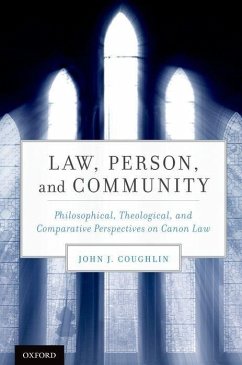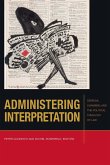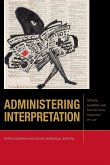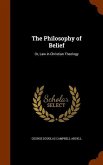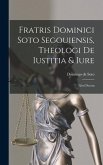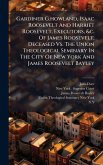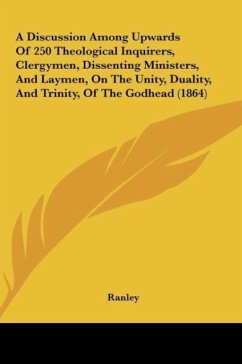John J. O. F. M. Coughlin
Law, Person, and Community
Philosophical, Theological, and Comparative Perspectives on Canon Law
John J. O. F. M. Coughlin
Law, Person, and Community
Philosophical, Theological, and Comparative Perspectives on Canon Law
- Gebundenes Buch
- Merkliste
- Auf die Merkliste
- Bewerten Bewerten
- Teilen
- Produkt teilen
- Produkterinnerung
- Produkterinnerung
Law, Person, and Community: Philosophical, Theological, and Comparative Perspectives on Canon Law takes up the fundamental question "What is law?" through a consideration of the interrelation of the concepts of law, person, and community. As with the concept of law described by secular legal theorists, canon law aims to set a societal order that harmonizes the interests of individuals and communities, secures peace, guarantees freedom, and establishes justice. At the same time, canon law rests upon a traditional understanding of the spiritual end of the human person and religious nature of community.…mehr
Andere Kunden interessierten sich auch für
![Administering Interpretation Administering Interpretation]() Peter GoodrichAdministering Interpretation115,99 €
Peter GoodrichAdministering Interpretation115,99 €![Administering Interpretation Administering Interpretation]() Peter GoodrichAdministering Interpretation36,99 €
Peter GoodrichAdministering Interpretation36,99 €![The Philosophy of Belief The Philosophy of Belief]() George Douglas Campbell ArgyllThe Philosophy of Belief37,99 €
George Douglas Campbell ArgyllThe Philosophy of Belief37,99 €![The Light by Which We See Light: Or, Nature and the Scriptures. a Course of Lectures Delivered Before the Theological Seminary and Rutgers College The Light by Which We See Light: Or, Nature and the Scriptures. a Course of Lectures Delivered Before the Theological Seminary and Rutgers College]() Tayler LewisThe Light by Which We See Light: Or, Nature and the Scriptures. a Course of Lectures Delivered Before the Theological Seminary and Rutgers College31,99 €
Tayler LewisThe Light by Which We See Light: Or, Nature and the Scriptures. a Course of Lectures Delivered Before the Theological Seminary and Rutgers College31,99 €![Fratris Dominici Soto Segouiensis, Theologi De Iustitia & Iure: Libri Decem Fratris Dominici Soto Segouiensis, Theologi De Iustitia & Iure: Libri Decem]() Fratris Dominici Soto Segouiensis, Theologi De Iustitia & Iure: Libri Decem47,99 €
Fratris Dominici Soto Segouiensis, Theologi De Iustitia & Iure: Libri Decem47,99 €![Gardiner G.howland, Isaac Roosevelt And Harriet Roosevelt, Executors, &c. Of James Roosevelt, Deceased Vs. The Union Theological Seminary In The City Of New York And James Roosevelt Bayley Gardiner G.howland, Isaac Roosevelt And Harriet Roosevelt, Executors, &c. Of James Roosevelt, Deceased Vs. The Union Theological Seminary In The City Of New York And James Roosevelt Bayley]() John DuerGardiner G.howland, Isaac Roosevelt And Harriet Roosevelt, Executors, &c. Of James Roosevelt, Deceased Vs. The Union Theological Seminary In The City Of New York And James Roosevelt Bayley27,99 €
John DuerGardiner G.howland, Isaac Roosevelt And Harriet Roosevelt, Executors, &c. Of James Roosevelt, Deceased Vs. The Union Theological Seminary In The City Of New York And James Roosevelt Bayley27,99 €![A Discussion Among Upwards Of 250 Theological Inquirers, Clergymen, Dissenting Ministers, And Laymen, On The Unity, Duality, And Trinity, Of The Godhead (1864) A Discussion Among Upwards Of 250 Theological Inquirers, Clergymen, Dissenting Ministers, And Laymen, On The Unity, Duality, And Trinity, Of The Godhead (1864)]() RanleyA Discussion Among Upwards Of 250 Theological Inquirers, Clergymen, Dissenting Ministers, And Laymen, On The Unity, Duality, And Trinity, Of The Godhead (1864)31,99 €
RanleyA Discussion Among Upwards Of 250 Theological Inquirers, Clergymen, Dissenting Ministers, And Laymen, On The Unity, Duality, And Trinity, Of The Godhead (1864)31,99 €-
-
-
Law, Person, and Community: Philosophical, Theological, and Comparative Perspectives on Canon Law takes up the fundamental question "What is law?" through a consideration of the interrelation of the concepts of law, person, and community. As with the concept of law described by secular legal theorists, canon law aims to set a societal order that harmonizes the interests of individuals and communities, secures peace, guarantees freedom, and establishes justice. At the same time, canon law rests upon a traditional understanding of the spiritual end of the human person and religious nature of community.
Produktdetails
- Produktdetails
- Verlag: OUP US
- Seitenzahl: 310
- Erscheinungstermin: 16. März 2012
- Englisch
- Abmessung: 240mm x 161mm x 21mm
- Gewicht: 631g
- ISBN-13: 9780199756773
- ISBN-10: 0199756775
- Artikelnr.: 34224735
- Herstellerkennzeichnung
- Libri GmbH
- Europaallee 1
- 36244 Bad Hersfeld
- gpsr@libri.de
- Verlag: OUP US
- Seitenzahl: 310
- Erscheinungstermin: 16. März 2012
- Englisch
- Abmessung: 240mm x 161mm x 21mm
- Gewicht: 631g
- ISBN-13: 9780199756773
- ISBN-10: 0199756775
- Artikelnr.: 34224735
- Herstellerkennzeichnung
- Libri GmbH
- Europaallee 1
- 36244 Bad Hersfeld
- gpsr@libri.de
John Coughlin is a Professor of Law at the University of Notre Dame. Prof. Coughlin served as professor of canon law of St. Joseph's Seminary in New York from 1994 to 2001. He also served the Archdiocese of New York as a judge in the Appeals Tribunal, as vicar of canonical and legal aspects of health care, and as a member of the boards of several Catholic hospitals and educational institutions. During the summer of 1998, Father Coughlin was a member of the delegation of the Holy See to the United Nations treaty conference that established the International Criminal Court.
* TABLE OF CONTENTS
* Preface and Acknowledgments
* Abbreviations
* Introduction
* I. Knowledge
* II. Law
* III. Person
* IV. Community
* V. An Overview of This Study
* Chapter 1 Canon Law and Anthropology
* I. Anthropology and the Foundation of Law
* II. Anthropological Characteristics
* A. Human Nature
* B. The Body
* C. The Soul
* D. Reason
* E. Affect
* F. Conscience
* G. Free Will
* H. Memory
* I. The Person as Social Being
* J. The End of the Human Person
* III. Conclusion
* Chapter 2 Canon Law and Theology
* I. Canon Law: Ordinance of Faith and Reason
* A. Biblical Anthropology
* B. Historical and Ontological in Canon Law
* C. Anthropology and Revelation
* D. Epistemology and Canon Law
* II. The Theological Justification of Canon Law
* A. Thomas, Luther, and Calvin
* B. Charism and Institution
* C. Communio and Canon Law
* III. Conclusion
* Chapter 3 Canon Law and Natural Law
* I. Human Nature as a Foundation for Law
* A. The New Natural Law Theory
* B. The Function of Natural Law in Canon Law
* C. The Relation Between Natural Law and Theology in Canon Law
* II. Classical and Modern Conceptions of Law and Reason
* A. The Classical Understandings of Law and Reason
* B. Law and Competing Modern Conceptions of Reason
* III. Conclusion
* Chapter 4 Canonical Equity
* I. Historical Development of Canonical Equity
* A. The Medieval Canonists
* B. St. Thomas and Suárez
* C. The Standard of Canonical Equity
* II. Canonical Equity in the Twentieth Century Codes
* A. Expressed Equity
* B. The Equitable Character of the Statute
* C. Unwritten Equity
* III. Historical Consciousness and the Objectivity of Canon Law
* IV. Conclusion
* Chapter 5 Development in Canon Law
* I. The Development of Canon Law and the Development of Doctrine
* A. Newman's Anthropological Analogy
* B. Papal Primacy
* 1. Sacred Scripture and Tradition
* 2. Head and Body
* 3. The CIC-1983
* II. Fundamental Rights in the CIC-1983
* A. The Meaning of Ius
* B. The Doctrine of Human Dignity and Human Rights Law
* C. The Natural Foundation of Human Rights
* D. The Theological Foundation of Human Rights
* III. A Comparison of Development in Canon Law with Positivism's
Secondary Rules
* IV. Conclusion
* Chapter 6 Personalism in Marriage
* I. The Goods of Marriage
* II. The Classical Understanding of Marriage and Secularization
* A. The Medieval Theory of Marriage
* B. The Demise of the Classical Understanding
* III. The Development of the Personalist Perspective in Canon Law
* A. Personalism and Vatican II
* B. Jurisprudence of the Roman Rota
* IV. Conclusion
* Chapter 7 Canon Law and the Secular State
* I. Traditional and Modern Views of Church State Relations
* II. Anthropological Assumptions and the First Amendment
* A. Theological Anthropology
* B. Rationalist Anthropology
* III. The Catholic Schools and the First Amendment
* A. Schools and the One Best System
* B. Strict-Separationism
* C. Problems with Public Policy by Judicial Review
* IV. Conclusion
* Chapter 8 The Impact of Neutral Rules on Hierarchical Churches
* I. The Supreme Court's Neutral Rules Approach
* A. Judicial Deference to Hierarchical Churches
* B. Neutral Rules
* C. Problems with Neutrality
* II. Questions about the Impact of Neutral Rules on Hierarchical
Churches
* A. The Secular Court's Competency Over Church Doctrine and Law
* B. Congregational v. Hierarchical Church Government
* C. Tort Liability for Essentially Religious Decisions
* D. Excessive Entanglement and Judicial Review
* E. Generally Applicable Law and Religious Freedom
* III. Conclusion
* Conclusion
* I. Law
* II. Person
* III. Community
* Preface and Acknowledgments
* Abbreviations
* Introduction
* I. Knowledge
* II. Law
* III. Person
* IV. Community
* V. An Overview of This Study
* Chapter 1 Canon Law and Anthropology
* I. Anthropology and the Foundation of Law
* II. Anthropological Characteristics
* A. Human Nature
* B. The Body
* C. The Soul
* D. Reason
* E. Affect
* F. Conscience
* G. Free Will
* H. Memory
* I. The Person as Social Being
* J. The End of the Human Person
* III. Conclusion
* Chapter 2 Canon Law and Theology
* I. Canon Law: Ordinance of Faith and Reason
* A. Biblical Anthropology
* B. Historical and Ontological in Canon Law
* C. Anthropology and Revelation
* D. Epistemology and Canon Law
* II. The Theological Justification of Canon Law
* A. Thomas, Luther, and Calvin
* B. Charism and Institution
* C. Communio and Canon Law
* III. Conclusion
* Chapter 3 Canon Law and Natural Law
* I. Human Nature as a Foundation for Law
* A. The New Natural Law Theory
* B. The Function of Natural Law in Canon Law
* C. The Relation Between Natural Law and Theology in Canon Law
* II. Classical and Modern Conceptions of Law and Reason
* A. The Classical Understandings of Law and Reason
* B. Law and Competing Modern Conceptions of Reason
* III. Conclusion
* Chapter 4 Canonical Equity
* I. Historical Development of Canonical Equity
* A. The Medieval Canonists
* B. St. Thomas and Suárez
* C. The Standard of Canonical Equity
* II. Canonical Equity in the Twentieth Century Codes
* A. Expressed Equity
* B. The Equitable Character of the Statute
* C. Unwritten Equity
* III. Historical Consciousness and the Objectivity of Canon Law
* IV. Conclusion
* Chapter 5 Development in Canon Law
* I. The Development of Canon Law and the Development of Doctrine
* A. Newman's Anthropological Analogy
* B. Papal Primacy
* 1. Sacred Scripture and Tradition
* 2. Head and Body
* 3. The CIC-1983
* II. Fundamental Rights in the CIC-1983
* A. The Meaning of Ius
* B. The Doctrine of Human Dignity and Human Rights Law
* C. The Natural Foundation of Human Rights
* D. The Theological Foundation of Human Rights
* III. A Comparison of Development in Canon Law with Positivism's
Secondary Rules
* IV. Conclusion
* Chapter 6 Personalism in Marriage
* I. The Goods of Marriage
* II. The Classical Understanding of Marriage and Secularization
* A. The Medieval Theory of Marriage
* B. The Demise of the Classical Understanding
* III. The Development of the Personalist Perspective in Canon Law
* A. Personalism and Vatican II
* B. Jurisprudence of the Roman Rota
* IV. Conclusion
* Chapter 7 Canon Law and the Secular State
* I. Traditional and Modern Views of Church State Relations
* II. Anthropological Assumptions and the First Amendment
* A. Theological Anthropology
* B. Rationalist Anthropology
* III. The Catholic Schools and the First Amendment
* A. Schools and the One Best System
* B. Strict-Separationism
* C. Problems with Public Policy by Judicial Review
* IV. Conclusion
* Chapter 8 The Impact of Neutral Rules on Hierarchical Churches
* I. The Supreme Court's Neutral Rules Approach
* A. Judicial Deference to Hierarchical Churches
* B. Neutral Rules
* C. Problems with Neutrality
* II. Questions about the Impact of Neutral Rules on Hierarchical
Churches
* A. The Secular Court's Competency Over Church Doctrine and Law
* B. Congregational v. Hierarchical Church Government
* C. Tort Liability for Essentially Religious Decisions
* D. Excessive Entanglement and Judicial Review
* E. Generally Applicable Law and Religious Freedom
* III. Conclusion
* Conclusion
* I. Law
* II. Person
* III. Community
* TABLE OF CONTENTS
* Preface and Acknowledgments
* Abbreviations
* Introduction
* I. Knowledge
* II. Law
* III. Person
* IV. Community
* V. An Overview of This Study
* Chapter 1 Canon Law and Anthropology
* I. Anthropology and the Foundation of Law
* II. Anthropological Characteristics
* A. Human Nature
* B. The Body
* C. The Soul
* D. Reason
* E. Affect
* F. Conscience
* G. Free Will
* H. Memory
* I. The Person as Social Being
* J. The End of the Human Person
* III. Conclusion
* Chapter 2 Canon Law and Theology
* I. Canon Law: Ordinance of Faith and Reason
* A. Biblical Anthropology
* B. Historical and Ontological in Canon Law
* C. Anthropology and Revelation
* D. Epistemology and Canon Law
* II. The Theological Justification of Canon Law
* A. Thomas, Luther, and Calvin
* B. Charism and Institution
* C. Communio and Canon Law
* III. Conclusion
* Chapter 3 Canon Law and Natural Law
* I. Human Nature as a Foundation for Law
* A. The New Natural Law Theory
* B. The Function of Natural Law in Canon Law
* C. The Relation Between Natural Law and Theology in Canon Law
* II. Classical and Modern Conceptions of Law and Reason
* A. The Classical Understandings of Law and Reason
* B. Law and Competing Modern Conceptions of Reason
* III. Conclusion
* Chapter 4 Canonical Equity
* I. Historical Development of Canonical Equity
* A. The Medieval Canonists
* B. St. Thomas and Suárez
* C. The Standard of Canonical Equity
* II. Canonical Equity in the Twentieth Century Codes
* A. Expressed Equity
* B. The Equitable Character of the Statute
* C. Unwritten Equity
* III. Historical Consciousness and the Objectivity of Canon Law
* IV. Conclusion
* Chapter 5 Development in Canon Law
* I. The Development of Canon Law and the Development of Doctrine
* A. Newman's Anthropological Analogy
* B. Papal Primacy
* 1. Sacred Scripture and Tradition
* 2. Head and Body
* 3. The CIC-1983
* II. Fundamental Rights in the CIC-1983
* A. The Meaning of Ius
* B. The Doctrine of Human Dignity and Human Rights Law
* C. The Natural Foundation of Human Rights
* D. The Theological Foundation of Human Rights
* III. A Comparison of Development in Canon Law with Positivism's
Secondary Rules
* IV. Conclusion
* Chapter 6 Personalism in Marriage
* I. The Goods of Marriage
* II. The Classical Understanding of Marriage and Secularization
* A. The Medieval Theory of Marriage
* B. The Demise of the Classical Understanding
* III. The Development of the Personalist Perspective in Canon Law
* A. Personalism and Vatican II
* B. Jurisprudence of the Roman Rota
* IV. Conclusion
* Chapter 7 Canon Law and the Secular State
* I. Traditional and Modern Views of Church State Relations
* II. Anthropological Assumptions and the First Amendment
* A. Theological Anthropology
* B. Rationalist Anthropology
* III. The Catholic Schools and the First Amendment
* A. Schools and the One Best System
* B. Strict-Separationism
* C. Problems with Public Policy by Judicial Review
* IV. Conclusion
* Chapter 8 The Impact of Neutral Rules on Hierarchical Churches
* I. The Supreme Court's Neutral Rules Approach
* A. Judicial Deference to Hierarchical Churches
* B. Neutral Rules
* C. Problems with Neutrality
* II. Questions about the Impact of Neutral Rules on Hierarchical
Churches
* A. The Secular Court's Competency Over Church Doctrine and Law
* B. Congregational v. Hierarchical Church Government
* C. Tort Liability for Essentially Religious Decisions
* D. Excessive Entanglement and Judicial Review
* E. Generally Applicable Law and Religious Freedom
* III. Conclusion
* Conclusion
* I. Law
* II. Person
* III. Community
* Preface and Acknowledgments
* Abbreviations
* Introduction
* I. Knowledge
* II. Law
* III. Person
* IV. Community
* V. An Overview of This Study
* Chapter 1 Canon Law and Anthropology
* I. Anthropology and the Foundation of Law
* II. Anthropological Characteristics
* A. Human Nature
* B. The Body
* C. The Soul
* D. Reason
* E. Affect
* F. Conscience
* G. Free Will
* H. Memory
* I. The Person as Social Being
* J. The End of the Human Person
* III. Conclusion
* Chapter 2 Canon Law and Theology
* I. Canon Law: Ordinance of Faith and Reason
* A. Biblical Anthropology
* B. Historical and Ontological in Canon Law
* C. Anthropology and Revelation
* D. Epistemology and Canon Law
* II. The Theological Justification of Canon Law
* A. Thomas, Luther, and Calvin
* B. Charism and Institution
* C. Communio and Canon Law
* III. Conclusion
* Chapter 3 Canon Law and Natural Law
* I. Human Nature as a Foundation for Law
* A. The New Natural Law Theory
* B. The Function of Natural Law in Canon Law
* C. The Relation Between Natural Law and Theology in Canon Law
* II. Classical and Modern Conceptions of Law and Reason
* A. The Classical Understandings of Law and Reason
* B. Law and Competing Modern Conceptions of Reason
* III. Conclusion
* Chapter 4 Canonical Equity
* I. Historical Development of Canonical Equity
* A. The Medieval Canonists
* B. St. Thomas and Suárez
* C. The Standard of Canonical Equity
* II. Canonical Equity in the Twentieth Century Codes
* A. Expressed Equity
* B. The Equitable Character of the Statute
* C. Unwritten Equity
* III. Historical Consciousness and the Objectivity of Canon Law
* IV. Conclusion
* Chapter 5 Development in Canon Law
* I. The Development of Canon Law and the Development of Doctrine
* A. Newman's Anthropological Analogy
* B. Papal Primacy
* 1. Sacred Scripture and Tradition
* 2. Head and Body
* 3. The CIC-1983
* II. Fundamental Rights in the CIC-1983
* A. The Meaning of Ius
* B. The Doctrine of Human Dignity and Human Rights Law
* C. The Natural Foundation of Human Rights
* D. The Theological Foundation of Human Rights
* III. A Comparison of Development in Canon Law with Positivism's
Secondary Rules
* IV. Conclusion
* Chapter 6 Personalism in Marriage
* I. The Goods of Marriage
* II. The Classical Understanding of Marriage and Secularization
* A. The Medieval Theory of Marriage
* B. The Demise of the Classical Understanding
* III. The Development of the Personalist Perspective in Canon Law
* A. Personalism and Vatican II
* B. Jurisprudence of the Roman Rota
* IV. Conclusion
* Chapter 7 Canon Law and the Secular State
* I. Traditional and Modern Views of Church State Relations
* II. Anthropological Assumptions and the First Amendment
* A. Theological Anthropology
* B. Rationalist Anthropology
* III. The Catholic Schools and the First Amendment
* A. Schools and the One Best System
* B. Strict-Separationism
* C. Problems with Public Policy by Judicial Review
* IV. Conclusion
* Chapter 8 The Impact of Neutral Rules on Hierarchical Churches
* I. The Supreme Court's Neutral Rules Approach
* A. Judicial Deference to Hierarchical Churches
* B. Neutral Rules
* C. Problems with Neutrality
* II. Questions about the Impact of Neutral Rules on Hierarchical
Churches
* A. The Secular Court's Competency Over Church Doctrine and Law
* B. Congregational v. Hierarchical Church Government
* C. Tort Liability for Essentially Religious Decisions
* D. Excessive Entanglement and Judicial Review
* E. Generally Applicable Law and Religious Freedom
* III. Conclusion
* Conclusion
* I. Law
* II. Person
* III. Community

